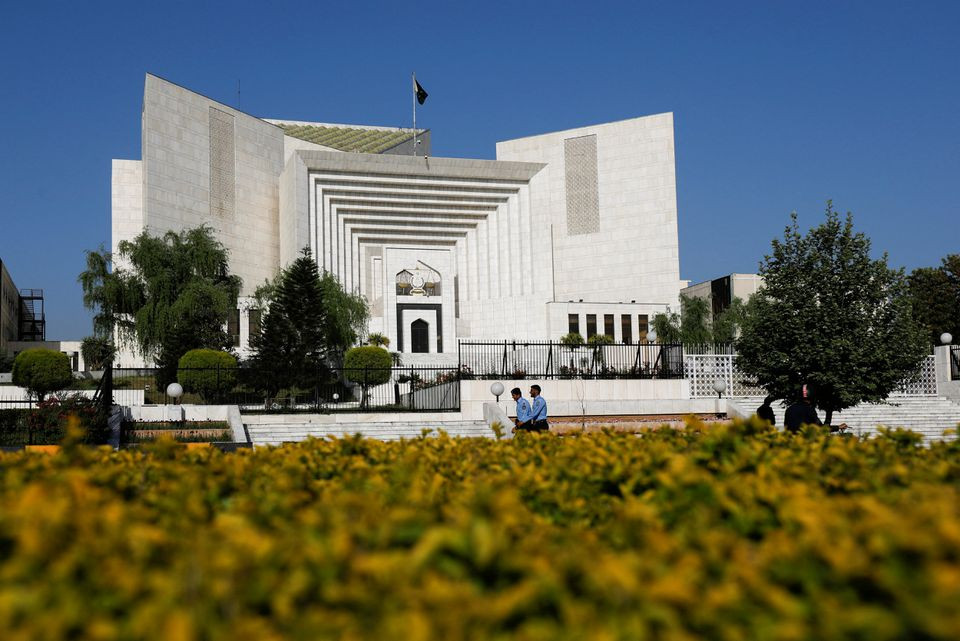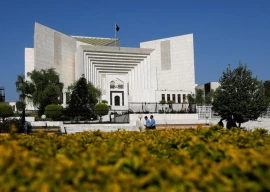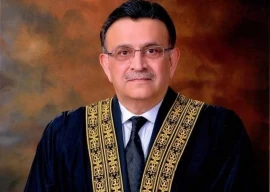
There is a difference of opinion among Supreme Court judges on the availability of suo motu review jurisdiction under Article 184-3 and Article 188 (read with Article 187) of the Constitution to re-visit, re-assess or set aside its judgments or orders that have finally been disposed of in the first review petitions.
Last month, Chief Justice of Pakistan Umar Ata Bandial, while accepting the federal government’s plea for the withdrawal of a curative review petition in Justice Qazi Faez Isa’s case, held that the top court recognised the existence of “suo motu review jurisdiction” to hear a second plea for complete justice.
He, however, noted that there was no existence of a second or curative review.
Earlier, the SC accepted Justice Isa’s review against the June 19, 2020 order.
Then on September 21, 2021, a three-judge bench of the apex court led by CJP Bandial and comprising Justice Syed Mansoor Ali Shah and Justice Muhammad Ali Mazhar debated the concept of a second review.
However, the written order was not issued for the last two years.
Now the bench has issued the written judgment, which is available on the SC’s website.
The bench unanimously held that a second review was not maintainable.
Justice Syed Mansoor Ali Shah in his separate note wrote that it was true that the SC Rules barred entertaining a second review petition.
However, he added that the SC Rules were silent on the point whether or not the apex court could exercise suo motu review jurisdiction to entertain a second review petition under Article 188 of the Constitution.
“In my opinion, it cannot do so for the reason that the prohibition on entertaining a second review petition is meant to put an end to litigation and ensuring [the] finality of the judgments and orders of the apex court … in the public interest,” the judge continued.
“If this is the substance and purpose of the Supreme Court Rules, the prohibition operates both on the parties in moving the second review petition and on the court as well, in exercising suo motu review jurisdiction the second time,” Justice Shah observed.
“If we assume that there is no prohibition on the suo motu exercise of its review jurisdiction the second time by the court regarding a judgment or order, there will be no end to litigation nor will there be any finality of the judgment or orders of the court as this suo motu review jurisdiction can then be exercisable for unlimited times and not only for the second time,” the judge wrote in his note.
Justice Shah noted that more importantly, the review jurisdiction conferred on the SC by Article 188 of the Constitution, was with regard to “any judgment pronounced or any order made by the court” under the preceding Articles of the Constitution, i.e. Articles 184 in its original jurisdiction or under Article 185 in its appellate dominion.
Article 188, he added, was not concerned with any judgment or order made in the review jurisdiction by the court under it.
“Unless the judgment or order passed on the first review petition or in the first suo motu review proceedings is recalled, the judgment or order passed in the original or appellate jurisdiction cannot be reviewed. If this is not the meaning and scope of the words ‘any judgment’ or ‘any order’ used in Article 188 of the Constitution but are taken to include the judgment or order passed in the review jurisdiction also, then any judgment or order passed in the second, third or fourth suo motu review proceedings will also be reviewable in the third, fourth or fifth suo motu review proceedings,” Justice Shah observed.
“Such an interpretation of the words ‘any judgment’ or ‘any order’ in Article 188 of the Constitution, if adopted, would be against the legislative intent and the public interest that lies in putting an end to litigation and ensuring [the] finality of the judgments and orders of the apex court,” the judge added.
Justice Shah wrote that Article 188 of the Constitution envisaged only one-time exercise of the review jurisdiction, whether made on a review petition or suo motu, by the SC in respect of any of its judgments or orders passed in its original or appellate jurisdiction.
“Revisiting, overruling or modifying a decision on a question of law or enunciation of a principle of law that was binding on all other courts in the country as per Article 189 of the Constitution, in a case other than that in which the decision or enunciation was made, must not be confused with reviewing that very judgment or order in which the said decision or enunciation was made,” he added.
“There is no limit, under the Constitution or any law, as to how many times a question of law once decided or a principle of law enunciated in one case can be revisited, if found necessary to do so, in some other case by a larger bench or the full court bench of this court, as an exception to the doctrine of stare decisis for the correction or development of the law declared by this court,” the judge observed.
The third member of the bench, Justice Mazhar, also agreed with Justice Shah’s opinion against the existence of a second review petition.


1732243059-0/mac-miller-(2)1732243059-0-165x106.webp)

1672385156-0/Andrew-Tate-(1)1672385156-0-165x106.webp)
1732240377-0/mac-miller-(1)1732240377-0-165x106.webp)















COMMENTS
Comments are moderated and generally will be posted if they are on-topic and not abusive.
For more information, please see our Comments FAQ